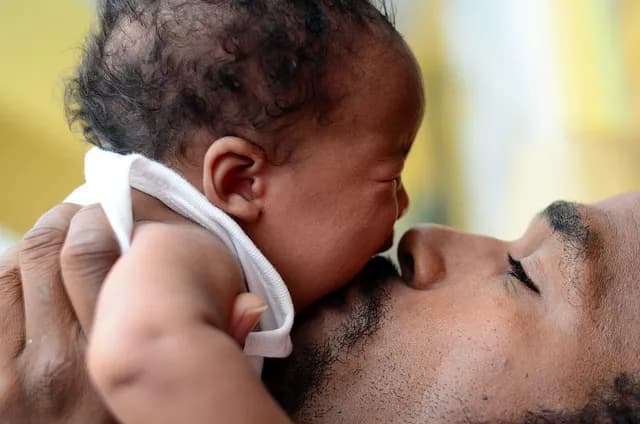A new study from the University of Rochester suggests that human intelligence might have evolved in response to the demands of caring for infants.
Steven Piantadosi and Celeste Kidd, assistant professors in brain and cognitive sciences, developed a novel evolutionary model in which the development of high levels of intelligence may be driven by the demands of raising offspring. Their study is available online in the Proceedings of the National Academy of Sciences' Early Edition.
"Human infants are born far more immature than the infants of other species. For example, giraffe calves are able to stand-up, walk around, and even flee from predators within hours of their births. By comparison, human infants cannot even support their own heads," said Kidd.
"Our theory is that there is a kind of self-reinforcing cycle where big brains lead to very premature offspring and premature offspring lead to parents having to have big brains. What our formal modeling work shows is that those dynamics can result in runaway pressure for extremely intelligent parents and extremely premature offspring," said Piantadosi.
In other words, because humans have relatively big brains, their infants must be born early in development while their heads are still small enough to insure a safe delivery. Early birth, though, means that human infants are helpless for much longer than other primates, and such vulnerable infants require intelligent parents. As a result, selective pressures for large brains and early birth can become self-reinforcing--potentially creating species like humans with qualitatively different cognitive abilities than other animals.
Piantadosi and Kidd tested a novel prediction of the model that the immaturity of newborns should be strongly related to general intelligence. "What we found is that weaning time--which acts as a measure of the prematurity of the infants--was a much better predictor of primate's intelligence than any of other measures we looked at, including brain size, which is commonly correlated with intelligence," said Piantadosi.
The theory may also be able to explain the origin of the cognitive abilities that make humans special. "Humans have a unique kind of intelligence. We are good at social reasoning and something called 'theory of mind'--the ability to anticipate the needs of others, and to recognize that those needs may not be the same as our own," said Kidd, who is also the director of the Rochester Baby Lab at the University of Rochester. "This is an especially helpful when taking care of an infant who is not able talk for a couple of years."
"There are alternative theories of why humans are so intelligent. A lot of these are based on factors like living in a harsh environment or hunting in groups," said Piantadosi. "One of the motivating puzzles of our research was thinking about those theories and trying to see why they predict specifically that primates or mammals should become so intelligent, instead of other species that faced similar pressures."
The key is live birth. According to the researchers, the runaway selection of intelligence requires both live birth of a single off spring and large brains, distinctive features of higher mammals.
"Our theory explains specifically why primates developed super intelligence but dinosaurs--who faced many of the same environmental pressures and had more time to do so--did not. Dinosaurs matured in eggs, so there was no linking between intelligence and infant immaturity at birth," said Kidd.
The above post is reprinted from materials provided by University of Rochester. The original item was written by Celeste Kidd and Monique Patenaude. Note: Materials may be edited for content and length.
Disclaimer: DoveMed is not responsible for the adapted accuracy of news releases posted to DoveMed by contributing universities and institutions.
Primary Resource:
Piantadosi, S. T., & Kidd, C. (2016). Extraordinary intelligence and the care of infants. Proceedings of the National Academy of Sciences, 201506752.
Related Articles
Test Your Knowledge
Asked by users
Related Centers
Related Specialties
Related Physicians
Related Procedures
Related Resources
Join DoveHubs
and connect with fellow professionals


0 Comments
Please log in to post a comment.